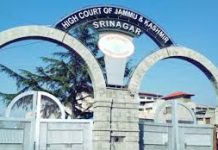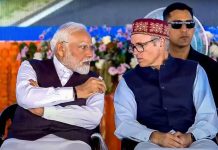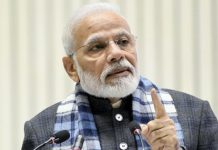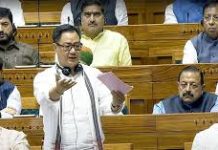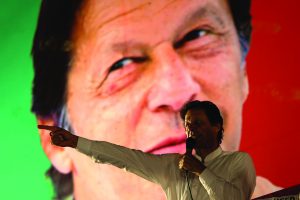 Pakistani Prime Minister Imran Khan — the cricketer-turned politician and the civilian face of the establishment, a word used for the army and its intelligence wing, the Inter services Intelligence (ISI) — appears to be groping in the dark to tackle the formidable political-economic crisis the country is facing. In his bid to assert himself even after completing 15 months in the coveted office, he betrays the aggressiveness of a cricket captain, He had represented a fresh approach, when in 1996, he had launched Pakistan Tehreek-e-Insaf (Pakistan movement for justice), but these decades of experience in the public life does not reflect the much-needed maturity of a senior politician.
Pakistani Prime Minister Imran Khan — the cricketer-turned politician and the civilian face of the establishment, a word used for the army and its intelligence wing, the Inter services Intelligence (ISI) — appears to be groping in the dark to tackle the formidable political-economic crisis the country is facing. In his bid to assert himself even after completing 15 months in the coveted office, he betrays the aggressiveness of a cricket captain, He had represented a fresh approach, when in 1996, he had launched Pakistan Tehreek-e-Insaf (Pakistan movement for justice), but these decades of experience in the public life does not reflect the much-needed maturity of a senior politician.
His frequent outbursts against his political rivals, especially the three-time prime minister, Nawaz Sharif, reflect his state of mind. A confused person, who claims to be a democratically elected leader of the 220 million people, but depends upon the might of the country’s armed forces. He is just like a babe in the wilderness of the murky complex.
Khan blessed by the establishment assumed the coveted office of the prime minister on August 18, 2018, but it appears his government is under seize of its own rhetoric. Taha Siddiqui, a France-based Pakistani journalist, has exposed the Khan regime’s inadequacy to tackle basic issues being faced by the country. He was expecting flow of investments, especially from the international donors, the Chinese, World Bank, and the non-resident Pakistani. His frequent visits to Beijing could not yield any substantial funds.
The Chinese investment in the OBOR (one belt one road) has considerably reduced, the international donors have forced the government to impose fresh taxes on the people facing massive unemployment. The major investors among the people of Pakistan too have been reluctant to invest in their homeland. Amidst this hard economic situation, the slogan in his election campaign slogan was “Naya (new) Pakistan”, but he is nowhere close to building a modern state. With his inability to move towards modernizing his country, he is now seeking religious slogans for retaining power to divert attention of the common people suffering under unprecedented price rise. His focus has now shifted from Naya Pakistan to convert Pakistan as an Islamic state on the pattern of Medina, as Hindus dream of a Ram Rajya, where common man is the centre of the governance.
In this Islamic concept of state, each citizen, including non-Muslims, had equal rights, but in his government, apart from Hindus and Sikhs, the Sindis, Mohajirs (the people of India migrated to Sind) and people of Balochistan are seeking asylum in different countries. Infuriated by the abrogation of special status to Jammu and Kashmir under the Indian Constitution, the Islamic parties, which mostly get support from the establishment have unleashed the concept of the two-nation theory, which led to the partition of India in 1947. The change in the constitutional status of Kashmir is being projected as an anti-Muslim measure. However, India’s Jamiat Ulema-e-Hind, the most respected of the Muslim organizations has endorsed the decision of the Narendra Modi government.
Apart from the concept of a dream Median state, Khan supporters among the Muslim radical intellectuals have aggressively projected Pakistan’s role in implementing ‘Ghazwa-e-Hind’, an Islamic concept that is given in the Hadith. Ghazwa means barbaric war. to conquer India.
After this war, all Idol worshipers will be murdered by the winning Islamic army. However, most of the Islamic scholars, including Jamiat Ulema-e-Hind, have called that it is misinterpretation of the religious text.
In spite of a friendly or controlled media, the communalization of politics in the country has few takers. Senior writers and journalists like Hasan Nissar and Najam Sethi have already expressed their doubts on the communal rhetoric. Khan is yet to realize that with the exit of the majority Muslim population of East Bengal, now Bangladesh, the two-nation theory is already dead and buried nearly half-a-century ago in 1971. It has become irrelevant with growing alienation of the people of Sind, Balochistan, and the people migrated from India, the Mohajirs.
A Cricket Guru was for a United India:
Imran Khan has to realise that even today most of the Muslim population in India, Bangladesh and Pakistan, including his ex-wife Reham Khan, a devout Muslim of the Deobandi school, is against communalism. He also needs to reminded that more than a century ago, Tufail Ahmad Manglori (1868-1946), an ace cricketer of Sir Syed Ahmed Khan’s Muhammadan Anglo-Oriental College (MAO) College, Aligarh, was aggressively campaigning against the Muslim League’s separatist politics. He also wrote comprehensively against separate electorates introduced during the colonial era.
Reham Khan, who has a large number of admirers in Pakistan, India and United Kingdom, had exposed political ineptitude of Imran Khan. In her book, she had warned that he would be a political disaster if he ever becomes prime minister.
Maligning Sharif
Imran’s efforts to frame Sharif and other politicians in corruption cases appear to have back-fired. The entire world knows that in Pakistan, the civilian governments function under the control of the GHQ, the army headquarters. It is also true that military dictators and their supporters have already siphoned off huge funds from Pakistan to lead lavish life in Dubai and London. In this backdrop, his repeated statement that he enjoys confidence of the army has weakened his political position as an elected leader. It has only exposed that he is just a novice in the jungle of Pakistani politics.
With Nawaz Sharif flying to London for treatment, Khan’s campaign against Nawaz Sharif, a three-time prime minister, appears to have flopped. He forgot that he is neither Zia-ul-Haq nor Z.A. Bhutto. Zia, the military dictator, could get irrepressible genius of the country hanged by manipulating the judiciary, because he hailed from Sind. The Punjabi-dominated army controls Pakistan, whether it is judiciary, legislature or media.
Unlike Bhutto, Nawaz Sharif has sizeable following in Punjab, which has more than 80 per cent representation in the army and its intelligence wing ISI as well as in the paramilitary troops; therefore, even General Musharraf, a Muhajir from Azamgarh district of Eastern Uttar Pradesh in India, who had ousted Sharif, could not get him assassinated. On the other hand, Benazir Bhutto, daughter of Z.A. Bhutto, was killed in a blast during the Musharraf regime. The culprits are still to be booked.
The 69-year Sharif has been allowed to fly to London under a judicial direction, which overruled the government’s demand of furnishing indemnity bond. Meanwhile, Sharif’s daughter, Marriyum Auranzeb, who is also the spokesperson of the Pakistan Muslim League (Noon), has intensified campaign against Imran Khan. He is holding big rallies across Punjab. Instead of taking up political issues, Imran Khan, is ridiculing Sharif’s illness. It may impact adversely on the reputation of his government, which has already suffered the Azadi March of a religious outfit Jamiat Ulema-e-Islam (JUI-F) led by Fazlur Rehman and supported by the Opposition.
The deteriorating situation in Pakistan may become a huge tragedy for the Indian sub-continent. The army may unleash violence against the other non-Punjabi people, the Muhajirs, Sindhis, and the religious minorities like Hindus and Sikhs.
The choices
With the worsening of the economic situation across the borders, there appears to be only two choices for the Indian government; firstly more strictness on the borders to stop entry into the country, secondly, allowing only Hindus, Sikhs and Christians from Pakistan to enter India. The officials of the home ministry argue that since Muslims have created a homeland, Pakistan, they cannot claim entry in India on the plea that their forefathers belonged to India.
A large section of activists, journalists, writers and intellectuals across the country are opposed to the proposed legislation, which undermines the secular character of the Indian state. It smells communalism at a time, when Muslims are fed p with the radical Islam and there is a long list of pro-India Muslims within Pakistan as well as in Canada and United Kingdom. They admire the ascendency of Narendra Modi in the Indian politics and consider him a true Indian, who does not want to be indulging in appeasing any community.
The choice before the Indian government is how to stop and tackle the new wave of refugees from Pakistan, who believe in united India had have suffered the partition for the 73 years. The proposal to implement the National Registry of Citizens (NRC) goes against the dream of united India. With the end of the two-nation theory, the NRC becomes irrelevant. It is yet to be seen how the people and government in India tackle the human tragedy, which may erupt any moment in our immediate neighbourhood.
letters@tehelka.com








